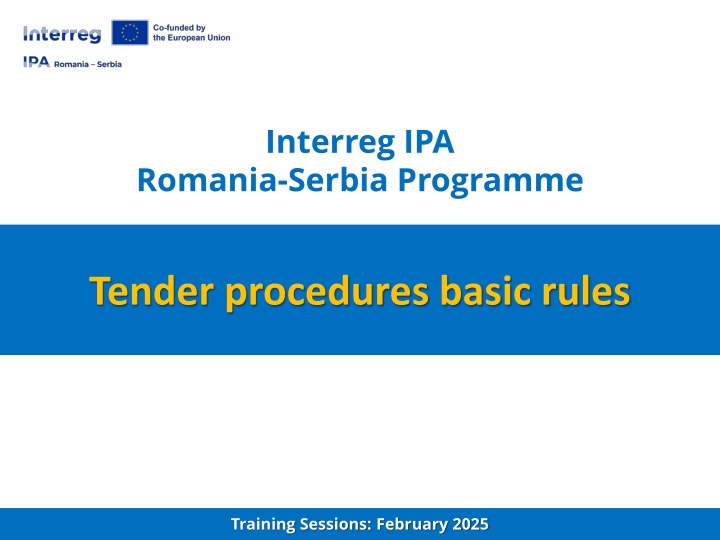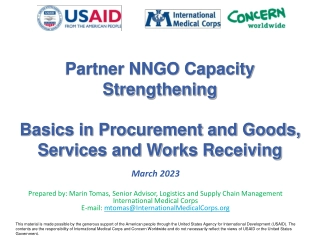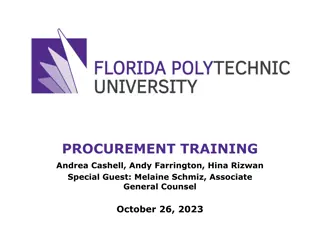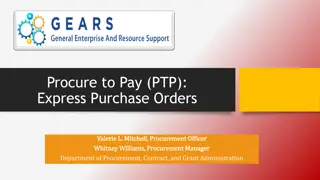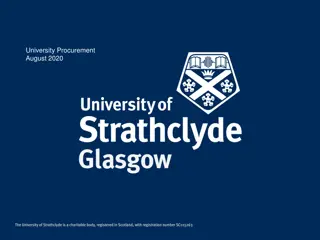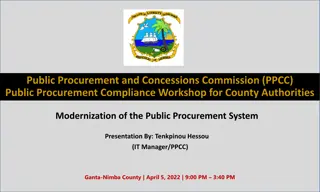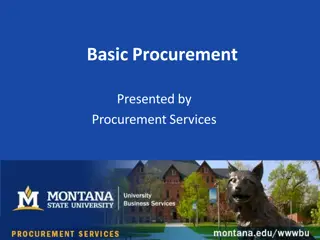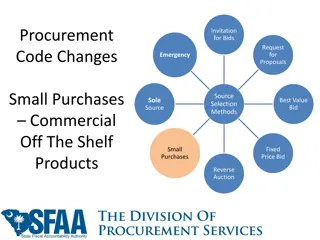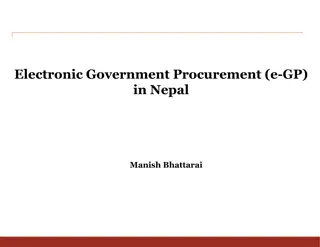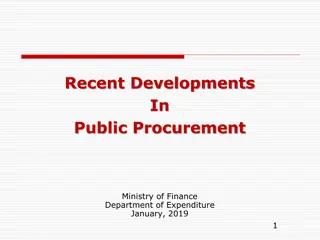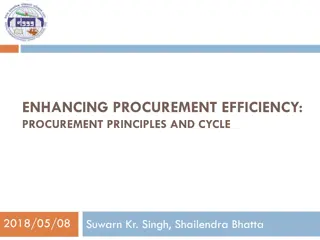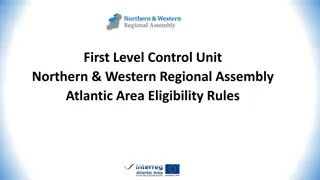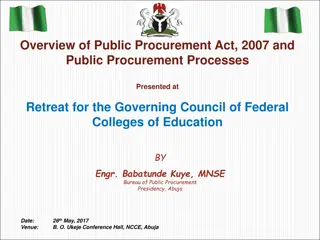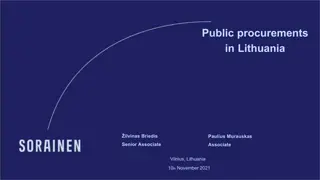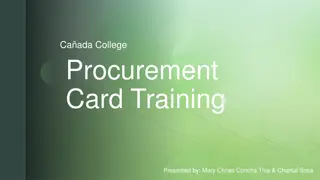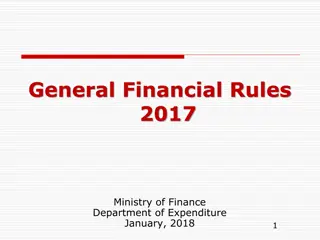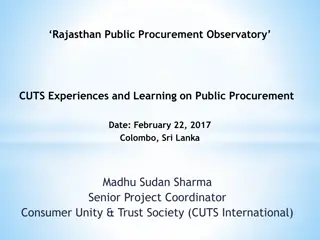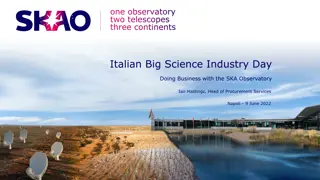Procurement Procedures and Basic Rules Training Sessions
In February 2025, the Interreg IPA Romania-Serbia Programme is conducting training sessions on procurement procedures, including the legal basis, mandatory principles, fair competition, and transparency. Private beneficiaries in Romania must adhere to specific rules and standards outlined by the EU. The training emphasizes fair competition, transparency, conflict of interest avoidance, contractor nationality, and exclusion grounds. It also covers the publication of procurement procedures and the participation of individuals or legal entities from any country in the tender process.
Download Presentation

Please find below an Image/Link to download the presentation.
The content on the website is provided AS IS for your information and personal use only. It may not be sold, licensed, or shared on other websites without obtaining consent from the author.If you encounter any issues during the download, it is possible that the publisher has removed the file from their server.
You are allowed to download the files provided on this website for personal or commercial use, subject to the condition that they are used lawfully. All files are the property of their respective owners.
The content on the website is provided AS IS for your information and personal use only. It may not be sold, licensed, or shared on other websites without obtaining consent from the author.
E N D
Presentation Transcript
Interreg IPA Romania-Serbia Programme Tender procedures basic rules Training Sessions: February 2025
Legal basis Romanian private beneficiaries of our Programme must follow the procurement procedures laid down by: Regulation (EU, Euratom) 2024/2509 of the European Parliament and of the Council of 23 September 2024 on the financial rules applicable to the general budget of the Union; Procurement and Grants for European Union external actions a Practical Guide Version 24 June 2022 (only for templates!!! & only for Serbian beneficiaries and for Romanian private beneficiaries); Standard documents and template; Procedural steps. Programme procedure for public procurement for the Serbian beneficiaries and for Romanian private beneficiaries; (published on Programme web site). Training Sessions: February 2025
Basic rules in procurement Mandatory principles: fair and transparent competition, equal discrimination, proportionality, publicity; Avoiding conflict of interest; Contractor nationality and goods origin rule; Grounds for exclusion; Ethics clauses; Use of standard documents; The rule on the language to be used; Award principles; Visibility. treatment, non- Basic rules : Training Sessions: February 2025
Basic rules in procurement Fair and transparent competition: All the conditions of the procedure to be transparently presented in advance, to all potential participants; The contract must be awarded to the most economically advantageous tender (i.e. the tender offering the best price-quality ratio or the lowest price), in accordance with the principle of transparency and fair competition for potential contractors and taking care to avoid any conflicts of interest; No contract may be artificially split in order to avoid compliance with the applicable public procurement rules. Training Sessions: February 2025
Basic rules in procurement Depending on the tender procedure and the contract value offered, tenders should be published locally or at European level. Publicity: All procurement procedures will be published on the Programme`s website: www.romania-serbia.net The through email to the Joint Secretariat at least one day prior to the publication: documents shall be submitted tenders@brct-timisoara.ro Training Sessions: February 2025
Basic rules in procurement Rule of Nationality: All natural persons or all legal persons can participate procurement procedures from any country, with exceptions imposed by the European Union. Rule of Origin: All goods can originate from any country, irrespective of any thresholds, in case of all actions implemented in the framework of Interreg IPA Romania-Serbia Programme. in public Language rules: For secondary procurement procedures above 20.000 the use of English language is obligatory. Training Sessions: February 2025
Basic rules in procurement Exclusion criteria: a) Applicable for participation in procurement procedure: If the tenderer is in any condition defined as exclusion (bankrupted, convicted in an offence, professional misconduct etc. see Regulation 2024/2509 for reference) it will be excluded from competition. The candidate or tenderer will certify that it is not in one of these situations. b) Applicable during the procurement procedure: Contracts will not be awarded to candidates or tenderers who: Are subject to a conflict of interest. Are guilty of misrepresentation in supplying or fail to supply the information required as a condition of participation in the procedure. Find themselves in one of the exclusion situations. Training Sessions: February 2025
Applicable procurement procedures The procedures applicable to different types of procurement differ depending on the nature of the procurement: translations, training, catering, studies, transport services, etc. Supply Contracts materials, etc. Execution or both design and execution of works: construction, rehabilitation, etc. events, consultancy, Service Contracts furniture, equipment of all types, Works Contracts In case of mixed contracts, the type of intervention with the highest estimated value defines the overall type of contract. Training Sessions: February 2025
Procurement Thresholds - Services < 300.000 > 20.000 300.000 20.000 SERVICE International restricted tender procedure Single tender* Simplified procedure * According to the rules and templates provided in the Programme procedure for public procurement for the Serbian beneficiaries and for Romanian private beneficiaries. ** Payments for amounts less than or equal to EUR 2.500 may be made against invoice without prior acceptance of a tender. Training Sessions: February 2025
Procurement Thresholds - Supplies < 300.000 100.000 < 100,000 > 20,000 300.000 20.000 SUPPLY Local open tender procedure International open tender procedure Single tender* Simplified procedure * According to the rules and templates provided in the Programme procedure for public procurement for the Serbian beneficiaries and for Romanian private beneficiaries. ** Payments for amounts less than or equal to EUR 2500 may be made against invoice without prior acceptance of a tender. Training Sessions: February 2025
Procurement Thresholds - Works < 300.000 > 20.000 < 5.000.000 300.000 20.000 WORKS Local open tender procedure Single tender* Simplified procedure * According to the rules and templates provided in the Programme procedure for public procurement for the Serbian beneficiaries and for Romanian private beneficiaries. **Payments for amounts less than or equal to EUR 2500 may be made against invoice without prior acceptance of a tender. Training Sessions: February 2025
Steps in awarding contracts (I) Selecting procurement procedure: Contracting Authority between the approved budget and Contracting Plan. observe the correspondence Where contracts are subdivided in lots, the value of each lot is taken into account when calculating the overall threshold. Contracts must not be split artificially to avoid applying the correct procurement thresholds. Artificially splitting refers to the division of contracts of same nature into smaller quantities and amounts, or dividing contract implementation into artificial phases in order to avoid a stricter procurement procedure. During the procurement procedure, the contracting authority has the obligation to take all necessary steps to avoid situations of a nature to determine the emergence of a conflict of interest and/or the manifestation of unfair competition. Training Sessions: February 2025
Steps in awarding contracts (II) Definition of requirements Selection criteria: Economical, professional and technical capacity; the tenderer may rely on the capacities of other entities. The selection criteria must be clear and non-discriminatory, all requirements shall be proportionate to the size and nature of the contract and relevant to the specific contract to be awarded. Any changes to the selection criteria once set are unacceptable. Selection criteria must not be scored! Award criteria: Services Supplies the cheapest technically compliant offer (the lowest price of the offer that satisfies the minimum requirements). Works the cheapest technically compliant offer (the lowest price of the offer that satisfies minimum requirements). the best value for money (the most advantageous tender). * ratio 80% technical offer- 20% financial offer economically the Training Sessions: February 2025
Steps in awarding contracts (III) Tender documentation Contract Notice. Instructions to tenderers. Technical Specifications or Terms of Reference (services). Documentation indicating conditions for implementation period: format of reports, general conditions, specific conditions, format of guarantees etc. A set of documentation for information: Tender submission form. Format of technical offer: based on technical specifications or organization and methodology (services). Model of financial offer. An internet address where it is possible to consult these documents. Documentation presenting templates for submission of the offer: Training Sessions: February 2025
Steps in awarding contracts (IV) Preparation of tender documentation Terms of reference (services) / Technical specifications (supplies and works) define the specific conditions of the contract, influencing the overall quality and competitiveness of the procurement: must grant/ allow equal access of economic operators to the procurement procedure; must provide sufficiently detailed information about the nature of the procurement to allow tenderers to submit realistic tenders; must be precise in the description of requirements, clear and non- discriminatory, proportionate to the objective and/or the budget for the project; must have clearly defined, achievable and measureable inputs, outputs or outcomes; they specify what is required of the service, supply or work to be purchased. Technical specifications may not point to particular brands and types, and they may not limit competition by being too specific. Training Sessions: February 2025
Steps in awarding contracts (V) Evaluation Committee 3 or 5 Members YES Chairperson Secretary Voting Knowledge of English Declaration of impartiality and confidentiality NO NO YES YES YES YES YES YES Training Sessions: February 2025
Steps in awarding contracts (VI) 90 calendar days from the deadline for the submission of tenders, that can be extended with further 40 days, in exceptional cases; Extra 60 calendar days from the date of notification of the award of the contract, only for the tender selected. Period of validity of tenders is fixed at: Training Sessions: February 2025
Steps in awarding contracts (VII) Notifying the successful tenderer (Award Notice); Contract preparation and signature; Notifying the unsuccessful tenderers; Publicising the award of the contract. Award of the contract: Training Sessions: February 2025
Modification of the contracts A request for changes to the contract must not automatically be accepted by the contracting authority. There must be justified reasons for modifying a contract. The contracting authority must examine the reasons given and reject requests which are not fully substantiated. No changes to the contract may alter the award conditions prevailing at the time the contract was awarded. Following this logic, major changes, such as a fundamental change to the terms of reference or to the technical specifications, cannot be made by means of an addendum. Training Sessions: February 2025
Why do errors occur? ! insufficient knowledge of the rules ! lack of attention to details ! applying rules from other programmes ! applying outdated rules for example: -the request for experience in the EU is considered discrimination. -when the price of items in public procurement is significantly higher than the market price. -in the simplified procedure, it is not enough to publish on the Programme s website, it is also necessary to invite at least three participants. -specifying the brand name/brand in the technical specifications. Training Sessions: February 2025
